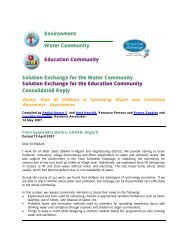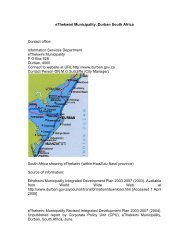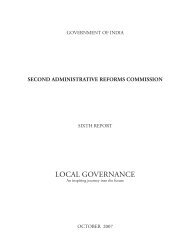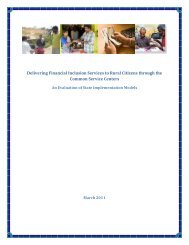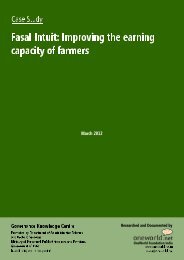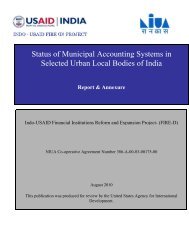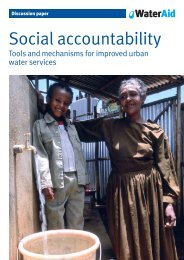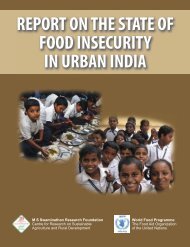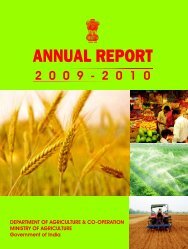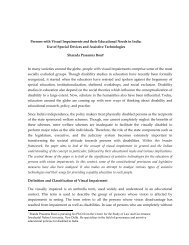Approaching equity - Indiagovernance.gov.in
Approaching equity - Indiagovernance.gov.in
Approaching equity - Indiagovernance.gov.in
- No tags were found...
Create successful ePaper yourself
Turn your PDF publications into a flip-book with our unique Google optimized e-Paper software.
1. Contexti. ChildrenThe Preamble to the Constitution of India ensuresrights to all citizens to a clean environment. Due to theglobal economic slowdown, attention and political willfor tackl<strong>in</strong>g climate change and manag<strong>in</strong>g environmentalissues like land, m<strong>in</strong>erals, forests, water, waste and pollutionand water has flagged dangerously. As the world’s averagetemperature rises year on year, the sea level also rises and thenumber of natural disasters <strong>in</strong>creases. The poorest and mostmarg<strong>in</strong>alised cont<strong>in</strong>ue to suffer the brunt of these adversechanges <strong>in</strong> climate. A global ‘Green Revolution’ is requiredwith <strong>in</strong>dividual states tak<strong>in</strong>g long term decisions to ensurethat future generations live <strong>in</strong> a clean and safe environment.Children must be central to all strategies which affect theenvironment because they are the ones who will face theconsequences of policy decisions made today. Unless wemake dramatic changes <strong>in</strong> how we use energy, water, landand forests, we will lose the development ga<strong>in</strong>s of the pastand risk our own children’s future.ii. YouthThere is rampant abuse of nature on which the survivalof human be<strong>in</strong>gs depends and especially of the youth(irrespective of position, community, region). Consider<strong>in</strong>gthe fact that the Right to Life gets precedence over the Rightto Development, our economic policies (and all <strong>in</strong>dustrialproject proposals) should adhere to environmental laws andregulations before even be<strong>in</strong>g considered for discussion orimplementation. We take this stand because human survivalis not dependent on <strong>in</strong>dustries of the modern world andalternative ways to give jobs to youth and create value <strong>in</strong> theeconomy can still be promoted.The <strong>in</strong>habitants of areas <strong>in</strong> natural sett<strong>in</strong>gs (<strong>in</strong>clud<strong>in</strong>ganimals, birds, etc.) and their rights are not consideredbefore impos<strong>in</strong>g economic decisions of urban human be<strong>in</strong>gson them. Natural areas also contribute to the economythrough ecological balance and tourism. This imposition ofthe economic will of a few urban people on the vast majorityof rural people is not a symbol of a progressive society.Communities have always been identified by theirculture aris<strong>in</strong>g out of their <strong>in</strong>teraction with their naturalsurround<strong>in</strong>gs. Natural resources must not be viewedseparately from the rights of communities liv<strong>in</strong>gharmoniously with them. Economic and social plann<strong>in</strong>gfor the country must start with this premise. Repeateddisplacement and migration due to various factors willgive rise to a populace with little connection with theenvironment as it is not their own, thus mak<strong>in</strong>g it evenmore difficult <strong>in</strong> the future to regulate their behaviour.There is a refusal to acknowledge and use traditionalknowledge and practices which can provide alternatives toproducts, services and professions and reduce environmentaldegradation. Even if there are alternatives, there is a lack ofpromotion of and awareness about these.35



